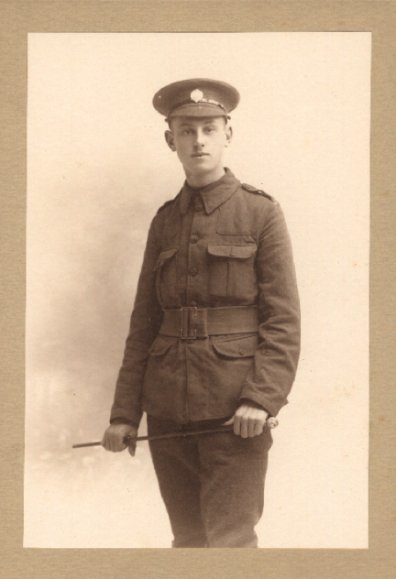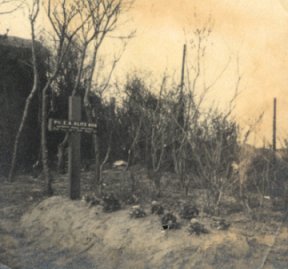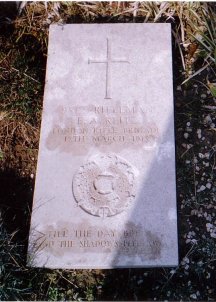In the family archives there are the following items:
Anthony's Military medals
- A thick, large bronze penny given to the relatives of each person who died in the services during World War I. Main side has raised Cenotaph with the words around: "THEIR NAME LIVETH FOREVER MORE". NOVEMBER 11th MCMXVIII ".On the obverse side are the figure of an angel wearing a helmet standing together with a young man.
- A gold-coloured, sovereign-sized medal with small ring on the top. One side having the words "THE GREAT WAR FOR CIVILISATION 1914-1919". on the reverse side is a standing figure of an angel with outspread wings. Around the edge is inscribed thus: "9512 P. E. A. KLITZ . 5 - LOND.R."
- A thick, sovereign-sized medal in what appears to be a pewter colour, inscribed around the edge exactly as above. It has a ribbon holder, sadly without the ribbon. George V head and 1914-1918 on one side and on the obverse is a raised horse with naked rider, with a sun above, a few wavey lines, a skull and crossbones below the right rear hoof, and another unidentified item under the right front hoof with additional signature - W Mc M.
TERRITORIALS RECORD NIGHT MARCH FROM LONDON TO BRIGHTON
The following commentary of the above march is edited from the copy of nine newspapers. I have put it together to give you as much as possible of the information and with some general interest in the atmosphere of the day.
LONDON TERRITORIALS RIFLE BRIGADE'S WORLD RECORD
20 APRIL 1914
By marching from London to Brighton in 14 hours and 23 minutes, 60 officers and N.C.O.'s and men, which included Evelyn Anthony Klitz, of the London Rifle Brigade (5th City of London Battalion, London Regiment) - the boys of Bunhill Row - have established a claim to the world's record for forced marching under full service conditions.
As the ranks of the dusty, khaki-clad men swung past the Brighton Aquarium, the clock stood at 9.53 am, and if the cheering crowd, who stood in the streaming sunshine to welcome the gallant 60, had known exactly what the reading of the clock signified their enthusiasm must have been a thousand times greater..........
At 7.27 pm on Saturday evening, 19 April 1914, these officers and men marched away from the Duke of York's Column in London. Most of the men worked in City Banks, shipping and Insurance offices and belonged to middle-class families. Every man was in the uniform and carried the equipment he would have done under active service conditions:
Overcoat
Filled water-bottle
Full night's rations
Shovel
Bayonet
|
|
Mess tin
Haversack
Pickaxe
Rifle
Ammunition pouches
|
This equipment weighs close on 50 lbs and the distance marched was not less than 52 and a half miles.
Marching at night might be thought to be an advantage. Well, it was in one way, but not in another. Saturday night in South London is a busy one and apparently everyone was out shopping; or the weekend deliveries were all being made at the same time, for the streets and roads were full of pedestrians and all kinds of wheeled traffic.
The first part of the march was through Westminster Bridge, Kennington, Brixton, Thornton Heath to Croyden. At Croyden it was simply terrible. The congestion was so great that the company had to drop into a pace of very little over two miles an hour at times, while trams, motor-buses and tradesmens' carts must have worried them more than a little.
In fact it was marching under difficulties until after passing Purley Corner. Not until then was it possible to get a clear road and at once the pace improved. The boys were walking to a schedule and it was anticipated they would never drop under the average rate of four miles an hour. They were beating this repeatedly and one newspaper reporter tried to keep up striding along with them, but added, "I had soon had enough of that" !
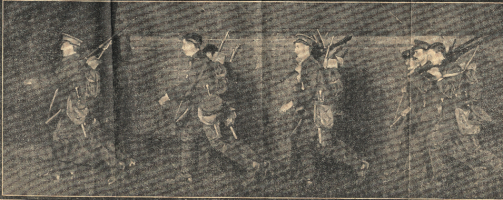
"This picture was secured by means of The Daily Mirror's wonderful new invention for taking pictures at night and shows some of the men going strong about 16 miles after leaving London."
(A reporter said, that at one point in the march, the men were upset at all the flashing of the newspaper photographers lamps as it made them temporarily unable to see where they were going.)
"An army, we are told, marches on its stomach, but what of its feet?". There were several cases of blistered feet and there was some patching up to be done at several places. One man had sinovitis and his knee continued to swell but it was bandaged and he pressed on. One place, Dale Hill, tested the boys' endurance to the limit - they came up the slope like lions, but they felt it after going over the crest. At Pyecome one man was as nearly out as possible but he pulled himself together - but there were some anxious moments - for had but one man failed to finish, the whole march would have been spoilt. Despite this they were merry and bright - all the way down they were singing. They were as keen as mustard and determined to keep up the reputation of the Rifles as Marathon champions of the Territorial Force.
At 10.59 pm they made Coulsdon and refreshed themselves with tea, coffee and biscuits and pipes. At Redhill, when some 20 miles had been covered, there was no halt, but eggs and milk and calves foot jelly, bananas and the like were served out from the provision car as the men marched along.
Lowfield Heath was reached at 2.29 am about 28 miles behind them. Here the men found a solid 'sit down' supper of soup, cold meat, porridge, eggs and bacon, cake etc. (Rice pudding and custard and lashings of tea appeared to be the favourite!)
At 3.12 am the men left Lowfield Heath and continued with a steady, soldierly swing. The day broke out soft and pearly and the larks grew busy as the trees silhouetted themselves against the sky. There had not been much to relieve the monotony of the steady tramping, though the beauty of the old-world village of Crawley in the early morning was not lost upon many in the ranks.
They reached Bolney after 38 miles where they gave quite a cultured rendition of "Here We are Again" and after using the 23 minute halt to eat a good breakfast, they pressed on for Pycombe, arriving there at 8.09 am. After this 46 miles two of the men collapsed, but were brought round during the quarter hour's halt. The company then moved off briskly on the final six miles stretch.
Towards the end of the march the sun tended greatly to the discomfort of the men but arrival in Brighton found the ranks in splendid formation and they reached the Aquarium earlier than expected, at 9.50 am - exactly 14 hours and 23 minutes, including stops, since leaving London.
All the men finished, not a man was carried a yard and they never broke their formation between halts. Yet these lads had only received 6 weeks training most of it in the last three weeks. On arrival in Brighton they had not the bearing of men who had walked all night; their ranks were firm; their alignment correct; their tread regular. Only their deeply flushed faces, dust-covered legs and here and there a collar thrown open, gave evidence of the long journey.
In Brighton, at Brill's Baths they found plenty of hot baths waiting for them and their ordinary clothes had been sent on from London. Their feet were carefully attended to and presently the happy company moved on the front to bask and laze in the sunshine until half-past twelve, when they all met for luncheon. Some came back to London soon afterwards, but many waited for the luxurious Pullman train, hoping to sleep in it's comfortable saloons.
"Really it was a Great Performance"
THE RECORDS:
London Rifle Brigade - 52 and a half miles - 14 hours 23 minutes.
Foreign Legion - 50 miles - 15 hours.
London Scottish - 52 and a half miles - 16 hours 40 minutes.
Postcard views on the card sent by Tony to his mother immediately after the march.
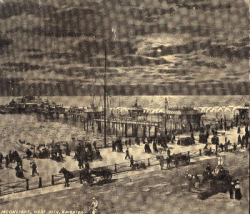 |
"Here we are again and very fit too having created a world's record for marching & beaten the Scottish by 2 and a quarter hours. Arrived 10.07 am. Very fit & had a brine bath & have spent the day in Brighton with Stewart and Vic.
Jack sends love to all will write you later.
Lots of love, Tony ".
|
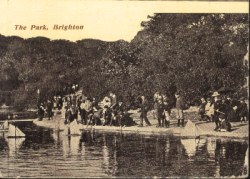 |
Newspapers' Comments
ONE - "NOT SO BAD!"
The fifty-two-mile march in 14 hours of some men and officers of the London Territorials is an achievement which will raise the prestige of the whole service, confound the croakers who insisted that our national physique was going to the dogs and cause much up-lifting of eyebrows among those foreign military critics who have been inclined to pooh-pooh our Territorials.
Comparisons are difficult to make with perfect fairness, but it is permissible to put it alongside a march made in the French manoeuvres of September 1900, which caused a good deal of elation in French breasts. In that march, General Cardot's Breton Brigade - and Bretons are notoriously the best set-up men in the French Army - walked 34 miles in one day, carrying 45 lbs and only 10 men fell out.
Of course, these Bretons were handicapped by marching in the daytime: it is much easier to walk at night; and of course, September is a warmer month than April. But against this must be set the fact that they carried 10 lbs less per man and covered 18 miles less too.
In the German Westphalian manoeuvres of 1907 the 19th Division did 40 miles in a single day - the actual duration of time we do not know - but we know they carried knapsack, overcoat, ammunition box, entrenching tool and section of canvas tents. This was also in September.
No doubt the heroes of the Brighton March were picked men and they had the advantage of a regiment containing all sorts and conditions. But when all allowances are made, the feat remains an exceptionally fine one.
It is useless naturally to compare the time with that made by lightly-clad walkers, who skim over the distance in a little over 8 hours, and do it too, after a long period of training for the event. But it is very far from useless to compare the actual value of the two achievements. The one is done under purely artificial conditions, the other represents what might be demanded in the stern realities of war.
TWO
Yesterday's performance by a squad of the London Rifle Brigade is something of a set-back to the prophets of national decadence. When 58 young men, engaged all the week in sedentary pursuits in the City, spend their week-end in a self-imposed march lasting all night and reel off their 50 miles in record time without any apparent effort, surely there is abundant evidence of the physical stamina which has always been the characteristic of the race. Upon such stamina intellectual and moral advancement alike rest, so that yesterday's feat is, after all, not unconnected with the march of progress.
Letter from Anthony to Leslie (Copied as written)
P. Company L. R. B.
Bisley Camp
Woking
Aug. 23rd 1914
My dear old Les
Here we are in camp at last and a very nice camp too, although a little unlike the usual thing, rations being a deal shorter & work & discipline a deal harder & stricter as far as I can see, we are promised 2 weeks solid company grind for a start. I believe the 9th are down here somewhere but of course they are not in our brigade.
We had a very nice trip down. Started from Charterhouse at 7.10 am on Thursday & reached Wimbledon at noon where we joined hands with the other battalions of the brigade. We were billeted in Wimbledon in schools overnight, & I intended to look up Reg, but as we had existed on biscuits & water since 5 that morning & it was then (in billets) 6 pm I decided (upon gentle persuasion) to go along with one or two others & have some grub. This we accordingly did & by the time we had found the aforesaid place and done ourselves proud it was 8 0c and leave expired at 8.30. So Reg was of course out of the question.
At Hersham we were billeted in beastly schools and unoccupied houses. We were very sick about this as the people of the village had everything ready for us & each was prepared to billet at least 2 men......... (Sorry I am not able to read this bit!)…………………… However the CO wouldn’t allow it and disappointed everyone, the old fool. As it was the villagers would not hear of our paying for grub we had it supplied us with fruit to hearts content, and were only too pleased to give anyone a sit down meal. We couldn’t have been treated better.
All the way from Hersham to here the roads, especially in the villages, were simply lined with people all with hundreds of apples, pears, plums & drinks so we were eating nearly all the way along.
Some of the battalions, notably the 6th & 7th marched shockingly & simply lined the roads by half companies. Chaps "miking", (means shirking) nothing more nor less, and they ought to have been ashamed of themselves for they couldn’t have been done up. The L. R. B. only lost 5 men from the whole battalion & none from ‘P’ Company!!!
We find the ground much softer than boards but being under war conditions grub is not so plentiful as normal. (There goes "cookhouse" and a cheer all down the lines, now for skilly and spuds & I’ll go on afterwards)
After the above - and very nice too!!!
It rained all last night and I thought we were going to get it wet, but this afternoon is lovely. The Bishop of London conducted Church Parade this morning. He is with us for 6 wks.
There are plenty of canteens etc about here as we are near the Middlesex Rifle Club shooting Place of which the L. R. B., Scottish and Stock Exchange are members & as the 2 latter are away we have a nice exclusive little canteen to ourselves while the junior ARP Stores have wet & dry & coffee canteens close by.
We are allowed no leave out of camp & washing places are as yet a minus quantity but we hope some will materialise ere long, at present we use buckets, and a stream!! We are messing in tents not marquees, which is very rotten after the latter. I wish you had had longer up here the other day, I suppose this is too far for a cycle run?
Give my love to them all, letter to above in future, not Bunhill now.
When are you off to Margate again?!!
Now I must hop it, I’ve got several more to write. Let me have in time soon
Best love
your affec bro Tony
THE ROLL OF HONOUR
A feeling of deep sympathy has been evoked for Mr and Mrs Klitz of the High Street, whose youngest son, Private Anthony Klitz, of the London Rifle Brigade, died in the Military Hospital at Boulogne on Friday.
The deceased gallant soldier was only 20 years of age and on the outbreak of war, immediately volunteered for active service. Soon afterwards he was sent to the front and after several weeks in the trenches was, on February 27th, seriously wounded through the forehead.
An operation was performed and for a time, although his condition was most critical, hopes were entertained that he would recover, but last week word was received that Meningitis had supervened and he died as stated.
The funeral took place on Saturday and the deceased soldier's brother had gone over to see him.
The deceased young soldier took part in the London to Brighton March, in full kit, on April 19th last year. This was a splendid performance for a youth of 19 to accomplish
Private Klitz's photograph will appear in the Roll of Honour next week, The Roll of Honour
John Cockram - Biographer of Lymington residents who were lost during World War One, has kindly supplied the following information about Evelyn Anthony.
EVELYN ANTHONY KLITZ - Rifleman - 9512
5th (City of London) Battalion, London Rifle Brigade who died on Friday 12th March 1915, aged 20.
Evelyn, or Anthony as he was known in the family, was born in Lymington in 1894, the youngest of eleven children, to William and Ellen Klitz of 88, High Street, Lymington. The family was an integral part of the musical life of Lymington, managing a music shop in the High Street. Like his brother Leslie he may have been a Choral Scholar at Winchester. I am indebted to his nephew, Bob Klitz, for this family information.
He lived in South Norwood and in early 1914 enlisted in London into the London Rifle Brigade. On the 19/20th April he took part in a record-breaking march by sixty of his unit from London to Brighton. This they did in fine style in 14 hours and 23 minutes. In a letter to his brother Les, written on the 23 August 1914, Anthony describes his experiences whilst in "P" Company, marching from Wimbledon to Bisley Camp and the conditions there. Another brother, Reginald, who lived in Wimbledon, enlisted into the Electrical Branch of the Royal Engineers.
Anthony's territorial battalion was amongst the earliest of its kind to serve in France. This it did as part of the 4th (Regular) Division, The Londons, being incorporated into the 11th Brigade, alongside the Ist (Regular) battalions of the Somerset Light Infantry, East Lancs, Hampshires and the Rifle Brigade.
Evelyn Anthony arrived in France with his battalion on the 4th November 1914 and joined the 11th Brigade in trenches at Plug Street, after its mauling in the 1st Battle of Ypres.
The four companies in the battalion rotated between three days in the trenches, three in support in farms just behind the line, three in billets in Plug Street and three days at rest in Armentiers.
According to a fellow rifleman, who was in the same area at the same time, the trenches were in muddy ground and surrounded by thousands of cans and empty tins. Water was everywhere and the water table was high. The front line, therefore, was made up of shallow ditches enhanced by sandbag breastworks. Whilst in the line they observed the German trenches 300 yards away through trench periscopes. There was some shelling, but the real threat was the ceaseless and accurate German snipers. Everything therefore had to be done doubled up and even at night they couldn't straighten themselves.
They cooked bacon and heated tinned food on an improvised brazier, wrote letters, read, kept guard and tried to improve the trenches. In reserve and at "rest", they formed nightly working parties and carried food and defensive stores up to the line.
On the 27th February 1915 Anthony was seriously wounded through the forehead. He was evacuated down the line until he found himself in the Women's Corps's hospital at Wimereaux, near Boulogne. An operation was performed and for a time, although his condition was most critical, hopes were entertained that he would recover. His brother, Les, visited him, but meningitis supervened and he died on the 12th March.
He is buried in Wimereaux Communal Cemetery in: Grave X11. 3. The family had inscribed on the bottom of the gravestone: "TiLL THE DAY BREAKS AND THE SHADOWS FLEE AWAY".
Evelyn Anthony's grave
back to top
Evelyn Anthony


